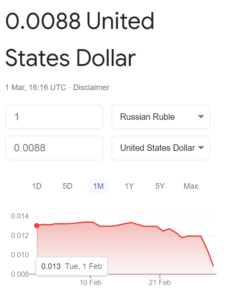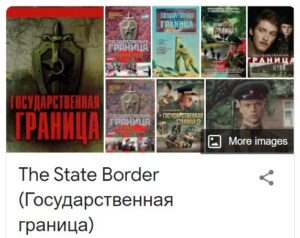Many of our colleagues are impacted in Ukraine and Russia during what is a very difficult time. FIT Council would like to express its solidarity, support and deep concern for their lives and working conditions (from Union of Translators of Russia website-you can download full statement here).
While the focus of the media worldwide has been on the plight of the citizens of Ukraine, there are other victims of Russia’s invasion: that is the people in Russia itself. The financial sanctions which many of the western countries have imposed on Russia is taking its toll on Russian citizens. And the community of translators in Russia is no exception.
What do translators think about the Russian invasion of Ukraine
GTS has over 200 registered translators in Russia. We have been speaking with many of them and the consensus is clear: the majority of the translators are against the actions of the Russian government in Ukraine. Furthermore, it would appear that this opposition is not predicated on personal convenience (loss of income, financial stress) but due to ideological motives. Most translators are not interested in this war! However, most of them are afraid to demonstrate their opposition for fear of arrest and political repercussions.
Putin and his circle must be arrested and an international tribunal organized
(KD, GTS translator in Moscow).I condemn this unprovoked invasion. I do not see any valid justification
(KD, GTS translator in St. Petersburg).I and my colleagues declare that we are against of any war, military operations and violence at our borders and in any part of the World! All the questions and disputes can be and must be discussed at the negotiating table! And we prey that the Russian-Ukrainian conflict ends ASAP with minimum lives lost from both sides!
(OK, GTS translator in Volograd)
There are however some who express support of the actions of their government.
After watching what the Ukrainian nationalism did to people who opposed it for 8 years, the way the US-led West did everything it could to instigate a proxy war between our countries for the US to step aside and reap the benefits at the cost of Russia and Europe, and the mind-boggling levels of exposed hypocrisy and misinformation coming from pro-US sources, I find the Russian operation justified and I intend to provide humanitarian aid to the people of Donbass.
(SL, GTS translator from Rostov-on-Don).The Russian troops are really a peace-making military operation in order to stop Ukrainian Nazis from mass slaughter and pure genocide relaunched by the Ukrainian President and its government against the dominating Russian population in Donetsk and Lugansk. I totally adhere to and support what my President is doing and in this situation he’s surely doing the right thing (as it was done in Crimea where the situation was quite the same). The genocide against Russians should be stopped and every people and nation (according to the UN Charter) has the right to self-determination which was done by the population of both Lugansk and Donetsk Republics. Any genocide is a crime against humanity. I’m sorry to realize that my country is standing all alone trying to stop this genocide while the Western “democracies” remain totally silent being faced with these Ukrainian actions. There’s just one reason for that: the more Russians die the less strong Russia is. And my country is surely quite an inconvenient competitor for the US because Russian gas and fuel are much cheaper than the American ones. So the real thing behind all that are just unfair business practices… paid by human lives. Russians were never considered to be humans by the West. Throughout our history these were only Western countries that were trying to conquer Russia and not otherwise (you surely do remember Napoleon, Hitler, the Swedish and the Polish invasions into Russia and so on). So there’s no pity in the West if several more thousands of Russians die… Thanks to China for their true understanding of the situation. Yet, otherwise, it’s an aggression. The problem here is that people are not really sure about what’s really going on. There is just no reliable source of information.
(SL, GTS translator from Moscow).I don’t know which facts are presented in mass media in the EU and North America. I think the facts are not true. The Ukraine since 1941 tried to separate from the Soviet Russia. However the people who established such a tendency were criminals. Bandera was used by German army with the purpose of spreading national ideas against Russia. It was just a trick against Soviet Russia and Soviet Army. The Germans used all remedies to defeat in that war. Only the crazy criminal could be useful for Germans; and Bandera cooperated with the enemy. He was simply a stupid bastard.The Soviet Union has been eliminating the Ukraine nationalists up to 1960s as enemies. You should see the Soviet film Государственная граница (“Territorial border”). This film is very representable – it says about all aspects of Ukraine nationalists. They use national ideas as a source of financial support. They promote false national ideas. They even kill Ukrainian people. Actually they are ready to kill everyone who resists them. For 8 years Ukraine nationalists pursuing commercial interests have been killing people in the Eastern Ukraine. The USA uses the Ukrainian nationalists to support political and commercial interests of the USA. Please, don’t be so stupid and don’t believe mass media in the EU and USA.
(АД, GTS translator from Cheboksary).
Digital payment options are narrowing
Translation companies and especially freelance translators are highly dependent on digital payment systems and international EFT (electronic fund transfers). Getting paid from outside Russia is becoming more challenging after the west removed many Russian banks from the SWIFT system. Some of our translators have reported that systems like Paypal, Google Pay and Payoneer have become unavailable. And if that isn’t enough to worry about, people who want to draw money from their savings may find that difficult after the Russian government closed the stock exchanges. Freelance translators who rely on payments from the USA and Europe will feel the impact the most. And working for Russian LSPs is not a great alternative, as the fees that they are willing to pay are very low.
Translation prices In Russia are low and may get even lower

English to Russian translation starts as low as US$0.02 per word, or 200-250 rubles per page (1800 ch. with spaces). But the ruble has lost about 30% of its value in the last week. This may not be that significant to translators who work with companies in the US and in Europe, but will be very bad for translators who draw their wages in rubles.
Even so, average rates in Russia will probably get lower. There is a continuous influx of new linguists around the world who try to attract clients by price dumping. Despite the more than twofold depreciation of the ruble since 2014, the purchasing power has decreased only moderately, and the local LSPs have not become any more flexible with their rates. Russian translators must also compete with translators in the Ukraine who sell their services for very low rates.
How many professional translators are there in Russia?
Estimating exact numbers is always difficult. There are about 12,000 English to Russian translators in Russia according to the Proz website. There are 4,750 in Translators Cafe. Taking into account in-house translators in the private sector and in government positions and assuming that many translators are not listed on either of these websites, the number of translators in Russia is probably around 30,000.
Translator associations in Russia
There are a number of professional translator associations. Although none of them have an accreditation program.
- National League of Translators, https://en.russian-translators.ru/ (English version available)
- Union of Translators of Russia, rutrans.org; Russian website.
The effect of boycotts on Russian localization projects
Many companies in the USA and Europe have imposed sanctions on Russia. This includes pulling out investments from Russia and suspension of commercial activities like shipping of cars and electronic products. This is bound to trickle down and lower the demand for Russian translation services purchased both in and outside of Russia.
Court-appointed translators in Russia
There is no system of sworn translation in Russia. Courts accept translations that are provided by translators that possess a certificate of completion of the State Courses of Foreign Languages to confirm qualifications to the court. A translator can physically go to a notary public’s office and sign the document translation on its last page in the notary’s presence. The notary certifies that it was really the translator who signed the translation. The Russian notary does not certify that the translation is correct; he or she just certifies that it is in fact the translator’s signature on the document and the notary assumes no liability for the translation content and accuracy.






